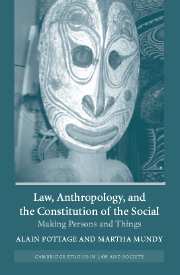Book contents
- Frontmatter
- Contents
- Notes on contributors
- 1 Introduction: the fabrication of persons and things
- 2 Res Religiosae: on the categories of religion and commerce in Roman law
- 3 Scientific objects and legal objectivity
- 4 Legal fabrications and the case of ‘cultural property’
- 5 Ownership or office? A debate in Islamic Hanafite jurisprudence over the nature of the military ‘fief’, from the Mamluks to the Ottomans
- 6 Gedik: a bundle of rights and obligations for Istanbul artisans and traders, 1750–1840
- 7 Losing (out on) intellectual resources
- 8 Re-visualising attachment: an anthropological perspective on persons and property forms
- 9 Our original inheritance
- Bibliography
- Index
6 - Gedik: a bundle of rights and obligations for Istanbul artisans and traders, 1750–1840
Published online by Cambridge University Press: 12 July 2009
- Frontmatter
- Contents
- Notes on contributors
- 1 Introduction: the fabrication of persons and things
- 2 Res Religiosae: on the categories of religion and commerce in Roman law
- 3 Scientific objects and legal objectivity
- 4 Legal fabrications and the case of ‘cultural property’
- 5 Ownership or office? A debate in Islamic Hanafite jurisprudence over the nature of the military ‘fief’, from the Mamluks to the Ottomans
- 6 Gedik: a bundle of rights and obligations for Istanbul artisans and traders, 1750–1840
- 7 Losing (out on) intellectual resources
- 8 Re-visualising attachment: an anthropological perspective on persons and property forms
- 9 Our original inheritance
- Bibliography
- Index
Summary
Law plays an important role in society not only in the regulation of human relations and transactions but also in providing a sense of order and continuity amid change. As such, law works as a tradition in its theoretical as well as practical orientation. It makes a claim to be the keeper of time-tested (historically rooted) conventions and principles that serve the good of society. Simultaneously, however, law has to adjust itself to changing circumstances, to demonstrate the relevance of the principles and guidelines with which it works and to continue to function as a shared reference in society. One may argue that without the coercive power of state authority, a legal tradition or system would achieve little. However, my interest lies in that ‘little’ space, where law can produce peaceful solutions to problems and conflicts based on its own conceptual and procedural resources.
Instances that test a legal tradition's capacity in this regard can shed some light on the ways in which law works or fails to work as an autonomous force mediating between change and continuity in society. Several articles in the present volume, including mine, discuss such instances within the realm of property relations, which are particularly vulnerable to developments in society. Most of the articles are about or written with an eye to modern Western legal practices.
- Type
- Chapter
- Information
- Law, Anthropology, and the Constitution of the SocialMaking Persons and Things, pp. 166 - 200Publisher: Cambridge University PressPrint publication year: 2004
- 9
- Cited by



